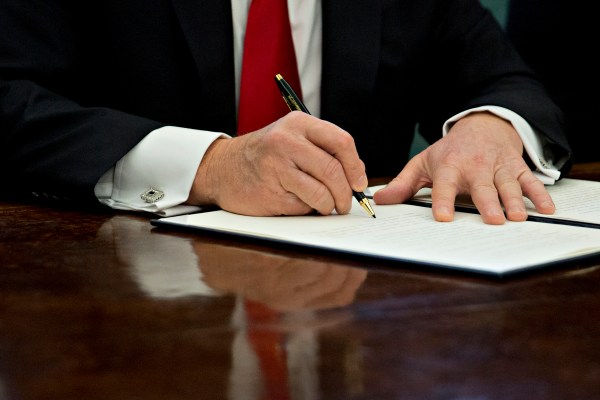A few weeks after passing both the Senate and House with an overwhelming majority, the controversial Allow States and Victims to Fight Online Sex Trafficking Act (FOSTA) has been signed into law.
In spite of only becoming official today, the bill has already begun to have a profound impact around the Web. Craigslist notably shuttered its Personals section here in the U.S., and Reddit adjusted its own rules in an attempt to brace for the coming law.
The Justice Department also began cracking down on sites — late last week, Backpage was seized by the DOJ and its owners were hit with a staggering 93-count indictment that reads like a laundry list of things for which you don’t want to get indicted.
“Trafficking is probably worse today than at any time in our history,” Trump told the press during a signing ceremony today. Ohio Senator Rob Portman, who co-sponsored the bill, sent out a press release stating, “This is a momentous day in the fight to help stop online sex trafficking, and a big victory for trafficking victims and survivors who for too long have been denied the opportunity to get the justice they deserve.”
In spite of overwhelming support from both sides of the aisle, the bill has been a controversial one, both among sex workers and internet rights advocates. In a post from late-February, the Electronic Frontier Foundation called the potential bill “a disaster,” noting that the onus for policing content would fall exclusively in the hands of sites hosting third-party content.
“[The bill] might sound noble, but it would do nothing to stop sex traffickers,” the EFF writes. “What it would do is force online platforms to police their users’ speech more forcefully than ever before, silencing legitimate voices in the process.”
The Foundation provided a followup comment, telling TechCrunch, “SESTA/FOSTA will do nothing to stop sex traffickers. This law is an attack on everyone’s right to speak and gather online. By exposing web platforms that may host sexual speech to wide-ranging civil and criminal liability, it incentivizes them to over-censor their users It’s deeply disappointing that neither Congress nor the president had the courage to speak up for the innocent people who will be silenced under the law, including the victims it will put in more danger.”
Sex workers have been equally critical of the bill and have called it, “devastating,” both with regards to their livelihood and a fear of increased violence if these sites are shuttered.
